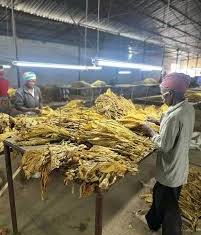lBy Edward Makuzva
Zimbabwe has officially launched a major agricultural program aimed at rolling out innovations such as smart farming, mechanization, improved seed varieties, and climate-smart practices to boost productivity and resilience.
The purpose is to accelerate the achievement of Zimbabwe’s Vision 2030 — the national plan to become an upper-middle-income economy by 2030, with key goals including poverty reduction, economic growth, food security, and modernization.
The Second Agricultural Research and Extension Symposium 2025, which kicks off Wednesday, is held under the theme “Transformative Agricultural Technologies Accelerating the Attainment of Vision 2030.”
In his opening remarks, Permanent Secretary in the Ministry of Lands, Agriculture, Fisheries, Water and Rural Development, Professor Dr. Obert Jiri emphasized that Zimbabwe’s mission is not merely to innovate but to uplift communities, revive the economy, and secure the country’s rightful place as Africa’s breadbasket.
Prof Jiri added that Vision 2030 sets a clear national target: transitioning Zimbabwe into an upper-middle-income society by the end of the decade. Agriculture, contributing over 18% of Gross Domestic Products(GDP) and employing 60% of the population, is identified as the bedrock of this transformation.
The three-day symposium highlights the vast potential of transformative technologies to address the pressing and multifaceted challenges facing the agricultural sector. Experts, innovators, and policymakers have gathered to explore how cutting-edge solutions can boost productivity, build resilience, and ensure food security in the face of climate change, resource scarcity, and shifting market demands.
Driving Change Through Transformative Technologies
The symposium showcased a range of innovations revolutionizing Zimbabwe’s agricultural sector, including:
“From AI-driven apps like EcoFarmer, which predict weather patterns, provide tailored agronomic advice, and diagnose crop diseases in real time, to solar-powered micro-irrigation systems that enable smallholder farmers to optimize water use and reduce costs, these innovations hold the key to unlocking truly sustainable agricultural practices,” Prof. Jiri explained.
In addition, Prof. Jiri revealed that the symposium showcased conservation agriculture techniques such as minimum tillage, crop rotation, and soil cover management, which not only increase yields but also improve soil health and carbon sequestration.
He added that digital platforms are also empowering farmers by linking them directly to markets, financial services, and supply chains, thereby cutting out middlemen and increasing profits for rural producers.
Participants emphasized that for these technologies to have real impact, capacity building, farmer training, and investment in rural infrastructure are critical. Public-private partnerships, supportive policies, and inclusive innovation were also highlighted as essential to ensure that smallholder farmers — who form the backbone of many African economies — are not left behind in the agricultural transformation.
Responding to advances in biotechnology, the Permanent Secretary highlighted that drought-tolerant ZAP maize hybrids and biofortified crops such as iron-rich beans and vitamin A sweet potatoes are already improving yields and tackling malnutrition in regions like Gutu and Chimanimani.
Climate-Smart Solutions
Prof Jiri reaveled that conservation agriculture, spearheaded by the Pfumvudza program, has tripled productivity on small plots, while solar-powered micro-irrigation systems and cold storage hubs are reducing water use and cutting post-harvest losses.
“The upcoming Presidential Solar Scheme will provide solar power to every household by 2030, enhancing the quality of life in rural areas and boosting agricultural productivity,” said Prof. Jiri.
On Government Commitment and Community Impact he added that currently supporting over 3 million households, the government is investing heavily in critical infrastructure, including dams, fishponds, boreholes, and irrigation systems.
The Presidential Climate-Proofed Input Scheme aims to reach 3.5 million households annually, boosting household food security, income generation, and employment opportunities.
Agricultural research remains at the core of these efforts. The Ministry collaborates with research institutes and international bodies such as to deliver technologies that enhance productivity for both crops and livestock.
However, the Permanent Secretary acknowledged persistent gaps between research and field application:
“Innovation dies on laboratory shelves without effective extension services. We are equipping our Agricultural Extension Officers with digital tools and reviving farmer-led innovation hubs to ensure breakthroughs reach the hands of our farmers.”
Overcoming Challenges and Building Partnerships
The symposium also tackled Zimbabwe’s distinctive agricultural challenges, emphasizing the urgent need to unlock funding by tapping into diaspora investments and global climate resources, such as the recently approved $50 million from the Green Climate Fund.
Participants underscored the importance of fast-tracking the national land audit to reinforce land tenure security, a critical step to encourage farmers to adopt modern technologies.
Furthermore, the discussions highlighted the necessity of broadening women’s land ownership and creating agri-tech incubators aimed at empowering youth, ensuring that the next generation is not only included but also positioned to drive innovation and resilience in the country’s agricultural sector.
Public-private partnerships were underscored as essential for driving innovation. “We call on companies like Cottco, Tongaat Hulett, and NetOne to co-invest in farmer-centric technologies,” said Prof. Jiri.
The symposium runs from Wednesday-Friday, bringing together government departments, universities, CGIAR research centers, the private sector, and farmers in a shared commitment to drive agricultural innovation and national transformation.

